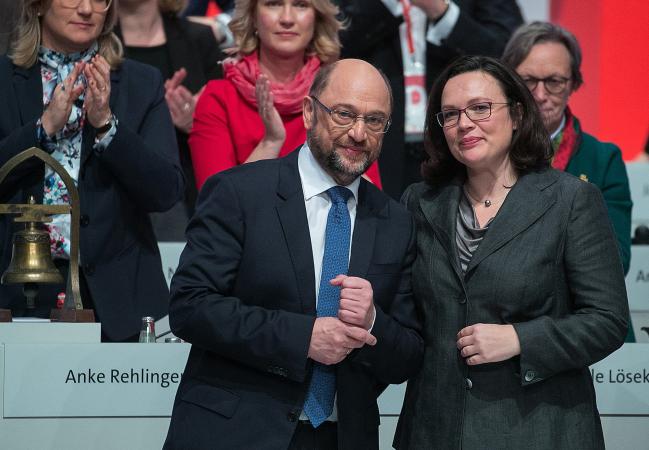(Bloomberg) -- Angela Merkel said Germany needs a stable government to strengthen Europe in a world fraught with risk as her Social Democratic rivals agreed to talks that could lead to a renewed alliance with the chancellor.
As she seeks to end Germany’s political stalemate and clear the way for her fourth term, Merkel argued that a European Union without a strong Germany and a robust Franco-German alliance is “unthinkable.”
“That’s why we have such a huge obligation to form a stable government,” Merkel told a convention of the Christian Social Union, her Bavarian sister party, in Nuremberg on Friday. Earlier in the day, the SPD’s leadership decided to open exploratory talks with her on forming Germany’s next government.
Almost 12 weeks after Merkel’s Christian Democratic-led bloc emerged victorious but weakened from a national election, talks on possibly renewing a “grand coalition” with the SPD are moving at a glacial pace. Many Social Democrats are wary of another tie-up and party leaders insist that a coalition isn’t a foregone conclusion.
Whither Germany?
Fresh from a two-day European Union summit, Merkel said she was peppered with questions in Brussels about “what’s going on with Germany?” She suggested that the deadlock is weakening the EU’s ability to deal with global turmoil, including an “ever stronger” China, a Russia plunging into Middle East conflicts and a U.S. leadership “focused more on itself.”
Merkel cited her speech at a CSU event in May, in which she declared -- referring to the U.S. -- that “the times we could fully rely on others are to some extent over.” Europe, led by Germany and France, must increasingly take its destiny in its own hands, she said Friday.
If talks with the SPD succeed, Merkel would get a rerun of a coalition that has governed Europe’s biggest economy for eight of her 12 years in office, including the last four.
Outlining his party’s stance, SPD head Martin Schulz said Friday the goal is to modernize Germany by beefing up education and social programs as well as enhancing job security.
“A lot is at stake,” Schulz told reporters in Berlin after SPD leaders reached their unanimous decision. “We want to contribute to an outcome that produces a stable government for Germany within a reasonable time.”
For more on Merkel’s attempts to form a government, click here.
It was an in-or-out moment for the SPD, whose leaders inserted a series of caveats and additional hurdles to try to make the road ahead palatable to party members. Underlying its wariness is a decline in voter support as Merkel repeatedly won credit for carrying out Social Democratic policies, such as a national minimum wage.
Bavarian premier Horst Seehofer, the CSU’s leader, told reporters in Nuremberg he’s “very optimistic” about talks with the SPD, though the party’s penchant for putting each stage of decision-making to a vote made the process difficult.
If the two sides conclude there’s enough common ground to keep talking, an SPD convention tentatively scheduled for Jan. 14 will vote on whether to open full-fledged coalition talks.
After a German election that eroded the political center, Europe’s dominant country is being run by Merkel in a caretaker capacity. Her attempt to enlist the Free Democrats and the Green party fell apart in November, leaving the SPD as an obvious choice.
Avoiding Commitment
Schulz on Friday fended off pressure by Merkel to commit to another “grand coalition” of the two biggest parties, a tried-and-true option that polls suggest is gaining increasing public support. Instead, he said there are “various models” for achieving a stable government.
“It remains to be seen whether the talks will lead to the creation of a new government,” Schulz said. “We mean that very seriously. We aren’t committing to a specific type of government formation.”
